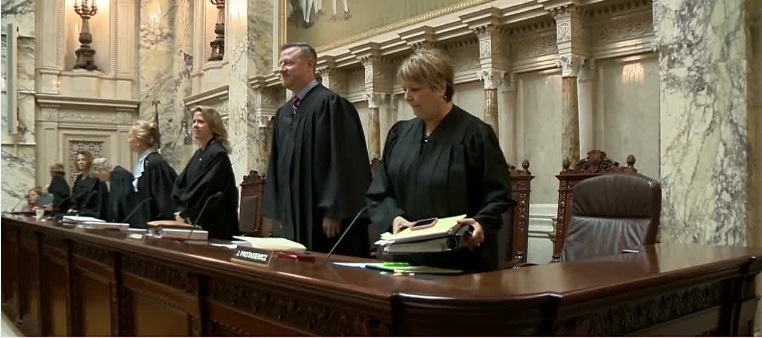In 1849, Wisconsin passed an abortion ban with no exceptions. This stood until Roe v. Wade became the law of the land. When the fascist faction of SCOTUS overturned it, Wisconsin went back to the 174-year-old law. This was immediately challenged and in December 2023, Dane County Circuit Court Judge Diane Schlipper ruled that the ban applied only to feticide from someone other than the mother and did not apply to abortions. This ruling was then appealed until it ended up in front of the Wisconsin Supreme Court.
Those in favor of the law strictly argued that the law is the law and were not at all concerned whether it was even a just law. While those opposed to the ban argued that it was unenforceable because it was so poorly written and because over the generations, other laws concerning abortions superseded the old law.
At least two of the Supreme Court Justices, Rebecca Dallet and Jill Karofsky, made it clear that they had real issues with the old law. Dallet pointed out that the law was not reflective of where we are as a society today and did not apply equally to everyone:
Liberal Justice Rebecca Dallet quickly challenged the validity of the 19th Century-era law, emphasizing that it was passed before women and men had equal rights.
“In 1849, the only people who had rights were white men with property,” Dallet said.
Karofsky took a much stronger, head-on position. First, she pointed out that a 12-year-old girl who was the victim of incest would be forced to carry the baby to term. Then she really drove home the absurdity and injustice of the abortion ban:
“How about a woman who is a college freshman here at the University of Wisconsin-Madison? If she is sexually assaulted and it’s charged as a third degree sexual assault… that would be intercourse without consent. If she became pregnant, as a result of the sexual assault, it would be illegal for her to obtain an abortion?” Karofsky said.
“Correct, it would be illegal for a doctor to provide an abortion to her in the state of Wisconsin,” Thome said.
“If her assaulter is charged…, he would be facing a 10-year maximum imprisonment because that would be a Class G felony,” Karofsky said. “In that case, the penalty for aborting, after a sexual assault, would be more severe than the penalty for the sexual assault.”
A study published in the Journal of the American Medical Association estimates that since the Dobbs decision more than 64,000 pregnancies have been cause by rape in states with abortion bans.
“I fear what you are asking this Court to do is to sign the death warrants of women and children and pregnant people in this state because under your interpretation they could all be denied life-saving medical care while the medical professionals who are charged with taking care of them are forced to sit idly by,” Karofsky said. “This is the world gone mad.”
The Wisconsin Supreme Court has also agreed to hear a second abortion-related lawsuit being brought by Planned Parenthood. In that lawsuit, they will be arguing that state’s Constitution guarantees the right to equal protection gives women the right to get an abortion and for doctors to perform it.

